Business Law > EXAM > WGU-D216 Business Law for Accountants Exam Study Guide Latest Updated (All)
WGU-D216 Business Law for Accountants Exam Study Guide Latest Updated
Document Content and Description Below
14th Amendment - ANSWER passed in 1868 after the Civil War, provides, in part, that "[n]o State shall . . . deprive any person of life, liberty, or property, without due process of law." action at ... law - ANSWER File a complaint, jury or judge, judgement, monetary damages or property action in equity - ANSWER File a petition, judge, decree, injunction, specific performance, or rescission administrative agency - ANSWER A federal or state government agency created by the legislature to perform a specific function, such as to make and enforce rules pertaining to the environment. appellant - ANSWER The party who takes an appeal from one court to another. appellee - ANSWER The party against whom an appeal is taken—that is, the party who opposes setting aside or reversing the judgment. Bill of Rights - ANSWER The first ten amendments to the U.S. Constitution. binding authority - ANSWER Any source of law that a court must follow when deciding a case. breaches - ANSWER To violate a law, by an act or an omission, or to break a legal obligation that one owes to another person or to society. business ethics - ANSWER Ethics in a business context; a consensus of what constitutes right or wrong behavior in the world of business and the application of moral principles to situations that arise in a business setting. case law - ANSWER The rules of law announced in court decisions. Case law interprets statutes, regulations, constitutional provisions, and other case law. categorical imperative - ANSWER A concept developed by the philosopher Immanuel Kant as an ethical guideline for behavior. In deciding whether an action is right or wrong, or desirable or undesirable, a person should evaluate the action in terms of what would happen if everybody else in the same situation, or category, acted the same way. checks and balances - ANSWER The system by which each of the three branches of the U.S. national government (executive, legislative, and judicial) exercises checks on the powers of the other branches. Civil law - ANSWER The branch of law dealing with the definition and enforcement of all private or public rights, as opposed to criminal matters. commerce clause - ANSWER The provision in Article I, Section 8, of the U.S. Constitution that gives Congress the power to regulate interstate commerce. common law - ANSWER a body of general rules that applied throughout the entire English realm compelling government interest - ANSWER A test of constitutionality that requires the government to have compelling reasons for passing any law that restricts fundamental rights, such as free speech, or distinguishes between people based on a suspect trait. concurring opinion - ANSWER A court opinion by one or more judges or justices who agree with the majority but want to make or emphasize a point that was not made or emphasized in the majority's opinion. Constitutional law - ANSWER Law that is based on the U.S. Constitution and the constitutions of the various states. Corporate social responsibility (CSR) - ANSWER The concept that corporations can and should act ethically and be accountable to society for their actions. cost-benefit analysis - ANSWER A decision-making technique that involves weighing the costs of a given action against the benefits of the action. courts of equity - ANSWER A court that decides controversies and administers justice according to the rules, principles, and precedents of equity. courts of law - ANSWER A court in which the only remedies that can be granted are things of value, such as money damages. In the early English king's courts, courts of law were distinct from courts of equity. Criminal law - ANSWER The branch of law that defines and punishes wrongful actions committed against the public. cyberlaw - ANSWER An informal term used to refer to all laws governing electronic communications and transactions, particularly those conducted via the Internet. damages - ANSWER A monetary award sought as a remedy for a breach of contract or a tortious act. defendant - ANSWER One against whom a lawsuit is brought, or the accused person in a criminal proceeding. defense - ANSWER Reasons that a defendant offers in an action or suit as to why the plaintiff should not obtain what he or she is seeking. dissenting opinion - ANSWER A court opinion that presents the views of one or more judges or justices who disagree with the majority's decision. due process clause - ANSWER The provisions of the Fifth and Fourteenth Amendments to the U.S. Constitution that guarantee that no person shall be deprived of life, liberty, or property without due process of law. Similar clauses are found in most state constitutions. Duty-based ethics - ANSWER An ethical philosophy rooted in the idea that every person has certain duties to others, including both humans and the planet. Those duties may be derived from religious principles or from other philosophical reasoning. Eighth Amendment - ANSWER Prohibits excessive bail and fines, as well as cruel and unusual punishment. Electronic Communications Privacy Act (1986) - ANSWER Prohibits the interception of information communicated by electronic means. equal protection clause - ANSWER The provision in the Fourteenth Amendment to the U.S. Constitution that guarantees that no state will "deny to any person within its jurisdiction the equal protection of the laws." This clause mandates that state governments treat similarly situated individuals in a similar manner. equitable maxims - ANSWER General propositions or principles of law that have to do with fairness (equity). establishment clause - ANSWER The provision in the First Amendment to the U.S. Constitution that prohibits Congress from establishing a state-sponsored religion, as well as from passing laws that promote religion or show a preference for one religion over another. ethical reasoning - ANSWER A reasoning process in which an individual links his or her moral convictions or ethical standards to the particular situation at hand. ethics - ANSWER Moral principles and values applied to social behavior. executive agencies - ANSWER An administrative agency within the executive branch of government. At the federal level, executive agencies are those within the cabinet departments. federal form of government - ANSWER A system of government in which the states form a union and the sovereign power is divided between a central government and the member states. Fifth Amendment - ANSWER Guarantees the rights to indictment (formal accusation) by a grand jury, to due process of law, and to fair payment when private property is taken for public use. The Fifth Amendment also prohibits compulsory self-incrimination and double jeopardy (trial for the same crime twice). Financial Services Modernization Act (Gramm-Leach-Bliley Act) (1999) - ANSWER Prohibits the disclosure of nonpublic personal information about a consumer to an unaffiliated third party unless strict disclosure and opt-out requirements are met. First Amendment - ANSWER Guarantees the freedoms of religion, speech, and the press and the rights to assemble peaceably and to petition the government. Four-Part Analysis - ANSWER When making decisions, a business should evaluate each of the following: The legal implications of each decision. The public relations impact. The safety risks for the consumers and employees. The financial implications. Fourth Amendment - ANSWER Prohibits unreasonable searches and seizures of persons or property. free exercise clause - ANSWER The provision in the First Amendment to the U.S. Constitution that prohibits Congress from making any law "prohibiting the free exercise" of religion. Freedom of Information Act (1966) - ANSWER Provides that individuals have a right to obtain access to information about them collected in government files. full faith and credit clause - ANSWER A clause in Article IV, Section 1, of the U.S. Constitution that provides that "Full Faith and Credit shall be given in each State to the public Acts, Records, and Judicial Proceedings of every other State." The clause ensures that rights established under deeds, wills, contracts, and the like in one state will be honored by the other states and that any judicial decision with respect to such property rights will be honored and enforced in all states. Health Insurance Portability and Accountability Act (1996) - ANSWER Requires health-care providers and health-care plans to inform patients of their privacy rights and of how their personal medical information may be used. States that medical records may not be used for purposes unrelated to health care or disclosed without permission. independent regulatory agencies - ANSWER An administrative agency that is not considered part of the government's executive branch and is not subject to the authority of the president. Independent agency officials cannot be removed without cause. IRAC - ANSWER method of legal reasoning. IRAC is an acronym formed from the first letters of the words Issue, Rule, Application, and Conclusion. laches - ANSWER The equitable doctrine that bars a party's right to legal action if the party has neglected for an unreasonable length of time to act on his or her rights. legal reasoning - ANSWER (1) The process of evaluating how various laws apply to a given situation. (2) The process by which a judge harmonizes his or her opinion with the judicial decisions in previous cases. majority opinion - ANSWER A court opinion that represents the views of the majority (more than half) of the judges or justices deciding the case. moral minimum - ANSWER The minimum degree of ethical behavior expected of a business firm, which is usually defined as compliance with the law. Ninth Amendment - ANSWER Establishes that the people have rights in addition to those specified in the Constitution. opinions - ANSWER A statement by a court expressing the reasons for its decision in a case. ordinances - ANSWER A law passed by a local governing unit, such as a city or a county. Outcome-based ethics - ANSWER An ethical philosophy that focuses on the impacts of a decision on society or on key stakeholders. persuasive authorities - ANSWER Any legal authority or source of law that a court may look to for guidance but need not follow when making its decision. petitioner - ANSWER In equity practice, a party that initiates a lawsuit. plaintiff - ANSWER A party that initiates a lawsuit. plurality opinion - ANSWER A court opinion that is joined by the largest number of the judges or justices hearing the case, but fewer than half of the total number. police powers - ANSWER Powers possessed by states as part of their inherent sovereignty. These powers may be exercised to protect or promote the public order, health, safety, morals, and general welfare. precedent - ANSWER A court decision that furnishes an example or authority for deciding subsequent cases involving identical or similar facts. preemption - ANSWER A doctrine under which certain federal laws preempt, or take precedence over, conflicting state or local laws. principle of rights - ANSWER The principle that human beings have certain fundamental rights (to life, freedom, and the pursuit of happiness, for example). A key factor in determining whether a business decision is ethical under this theory is how that decision affects the rights of others, such as employees, consumers, suppliers, and the community. Privacy Act (1974) - ANSWER Protects the privacy of individuals about whom the federal government has information. Regulates agencies' use and disclosure of data, and gives individuals access to and a means to correct inaccuracies. privileges and immunities clause - ANSWER A clause in Article IV, Section 2, of the U.S. Constitution that requires states not to discriminate against one another's citizens. A resident of one state cannot be treated as an alien when in another state; he or she may not be denied such privileges and immunities as legal protection, access to courts, travel rights, and property rights. probable cause - ANSWER Reasonable grounds for believing that a search should be conducted or that a person should be arrested. Procedural law - ANSWER Law that establishes the methods of enforcing the rights established by substantive law. remedies - ANSWER The relief given to an innocent party to enforce a right or compensate for the violation of a right. remedies at law - ANSWER A remedy available in a court of law. Money damages are awarded as a remedy at law. reporters - ANSWER A publication in which court cases are published, or reported. respondent - ANSWER In equity practice, the party who answers a complaint or other proceeding. search warrant - ANSWER An order granted by a public authority, such as a judge, that authorizes law enforcement personnel to search particular premises or property. Second Amendment - ANSWER States that the right of the people to keep and bear arms shall not be infringed. Seventh Amendment - ANSWER Guarantees the right to a trial by jury in a civil case involving at least twenty dollars. [Show More]
Last updated: 1 year ago
Preview 1 out of 31 pages
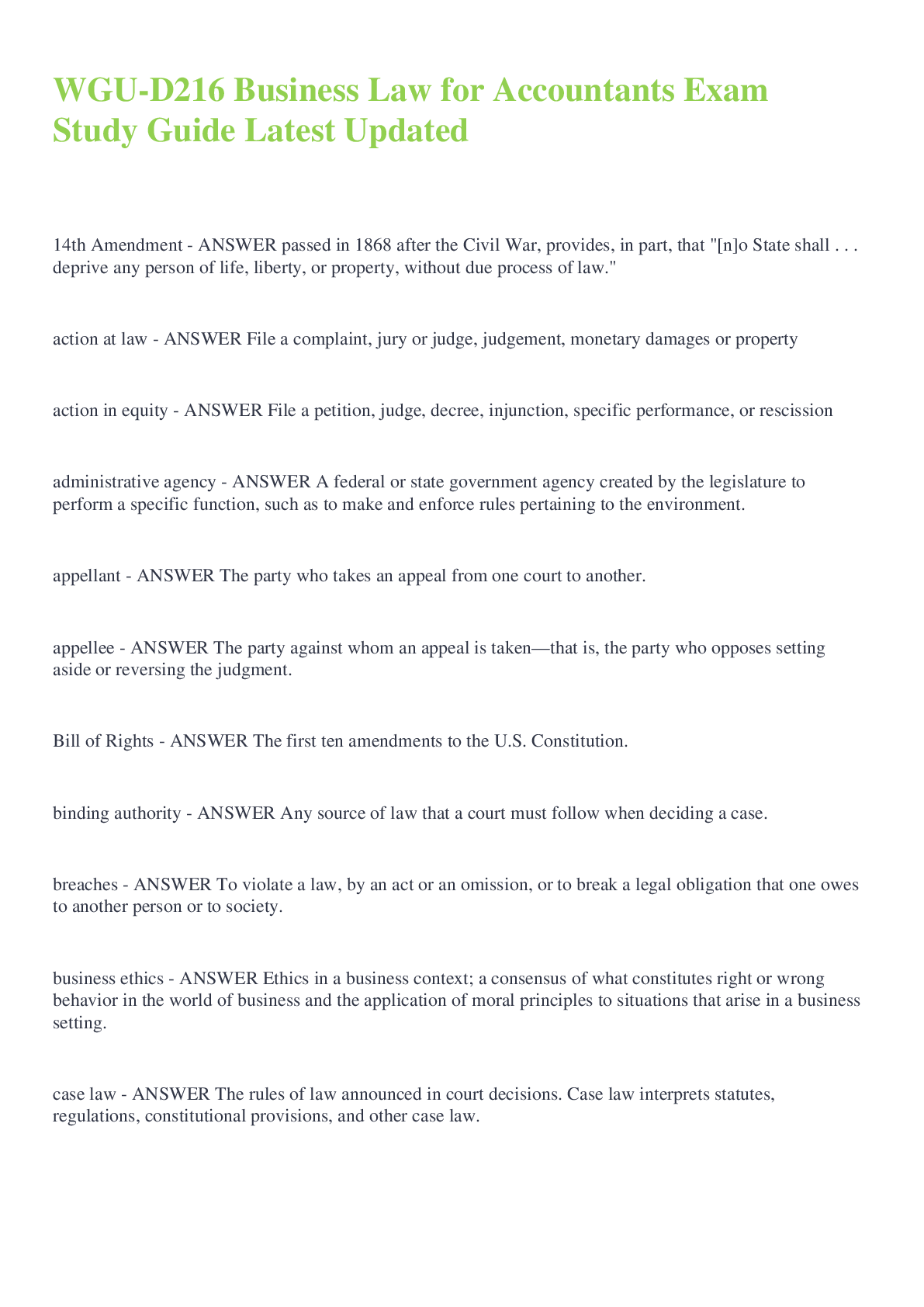
Reviews( 0 )
Recommended For You
*NURSING> EXAM > NUR 2790 / NUR2790 Professional Nursing III / PN3 Final Exam Study Guide Questions and Answers . Rasmussen College (All)
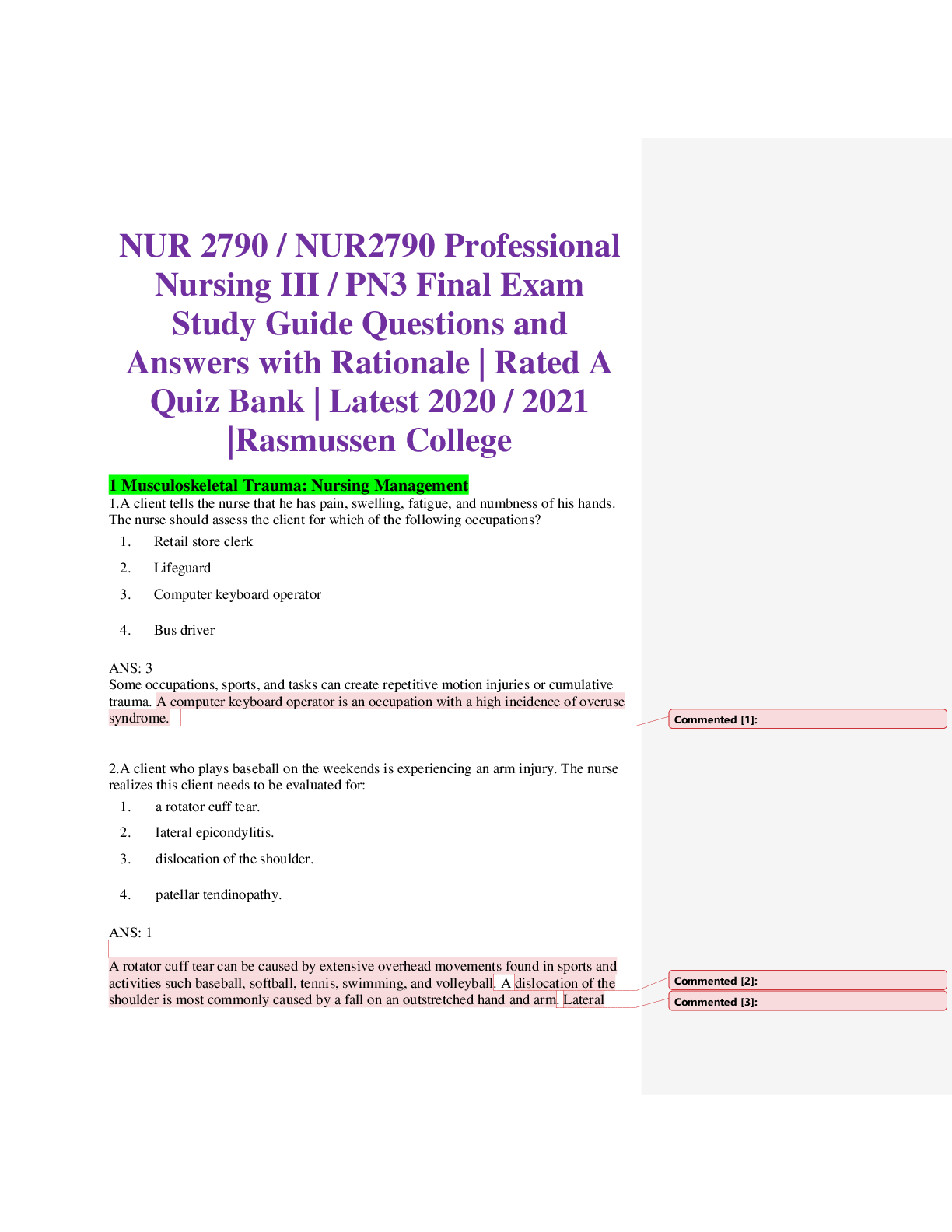
NUR 2790 / NUR2790 Professional Nursing III / PN3 Final Exam Study Guide Questions and Answers . Rasmussen College
NUR 2790 / NUR2790 Professional Nursing III / PN3 Final Exam Study Guide Questions and Answers with Rationale | Rated A Quiz Bank | Latest 2020 / 2021 |Rasmussen College 1 Musculoskeletal Trauma: N...
By nurse_steph , Uploaded: Dec 10, 2020
$12
Health Care> EXAM > NR 599 Week 8 Final Exam study Guide/ NR 599 Week 8 Final Exam study Guide (All)
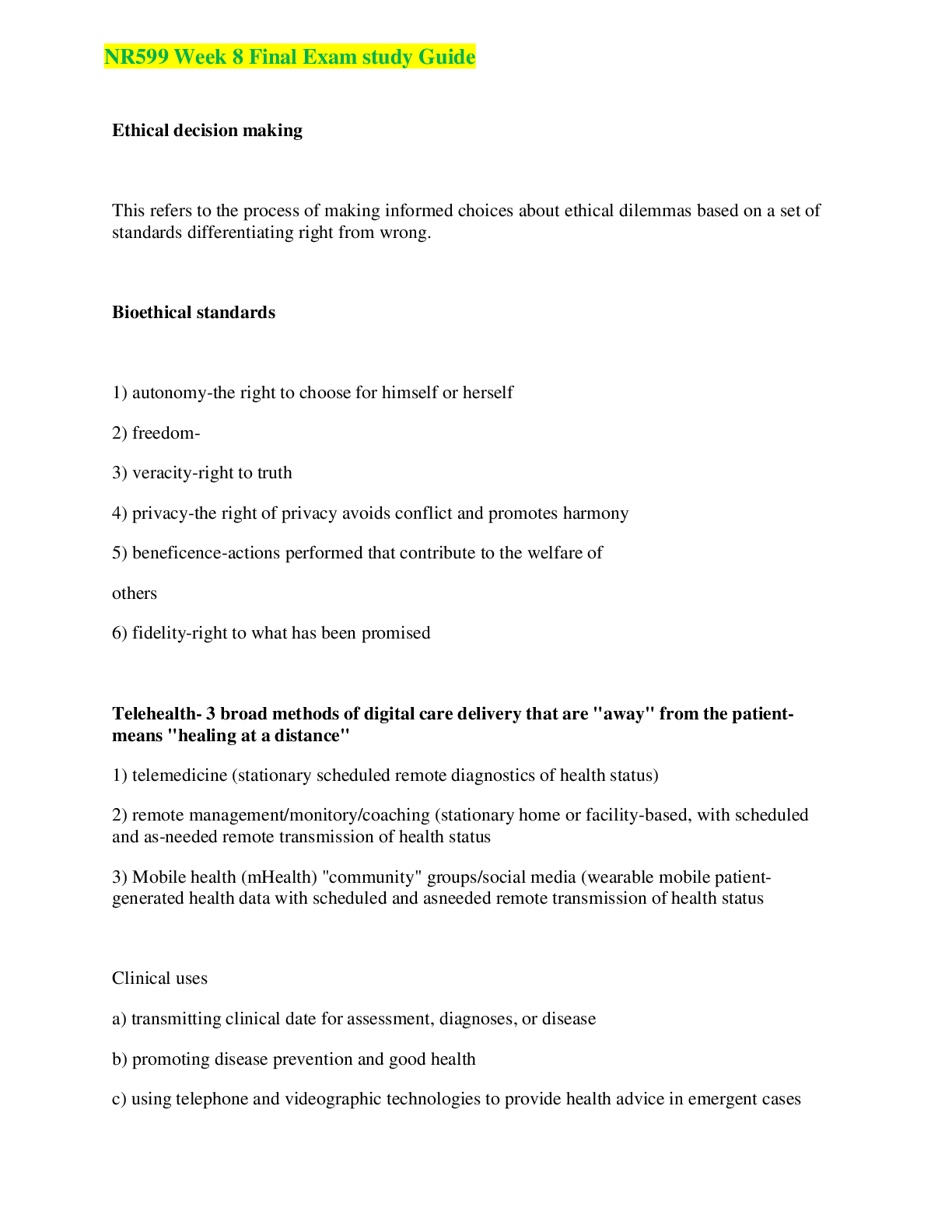
NR 599 Week 8 Final Exam study Guide/ NR 599 Week 8 Final Exam study Guide
NR599 Week 8 Final Exam study Guide
By QUIZBANK , Uploaded: Feb 21, 2021
$8
*NURSING> EXAM > NR566 Advanced Pharmacology for Care of the Family. Final Exam study guide (All)
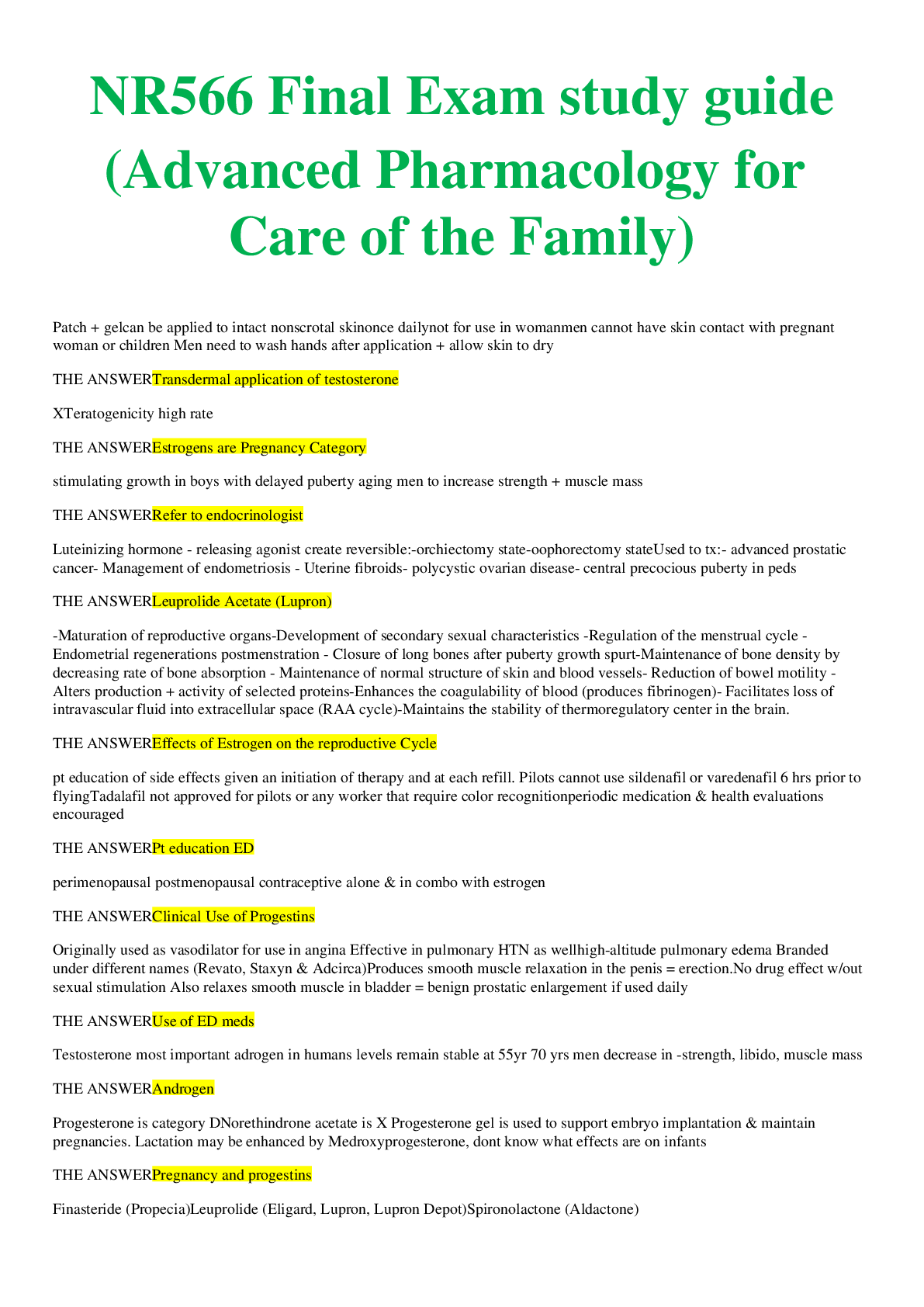
NR566 Advanced Pharmacology for Care of the Family. Final Exam study guide
NR566 Final Exam study guide (Advanced Pharmacology for Care of the Family) 1. Patch + gel can be applied to intact nonscrotal skin once daily not for use in woman men cannot have skin contact...
By A GRADE , Uploaded: Dec 18, 2020
$12
*NURSING> EXAM > NR565 / NR 565 Advanced Pharmacology Fundamentals Final Exam Study Guide | Rated A (All)
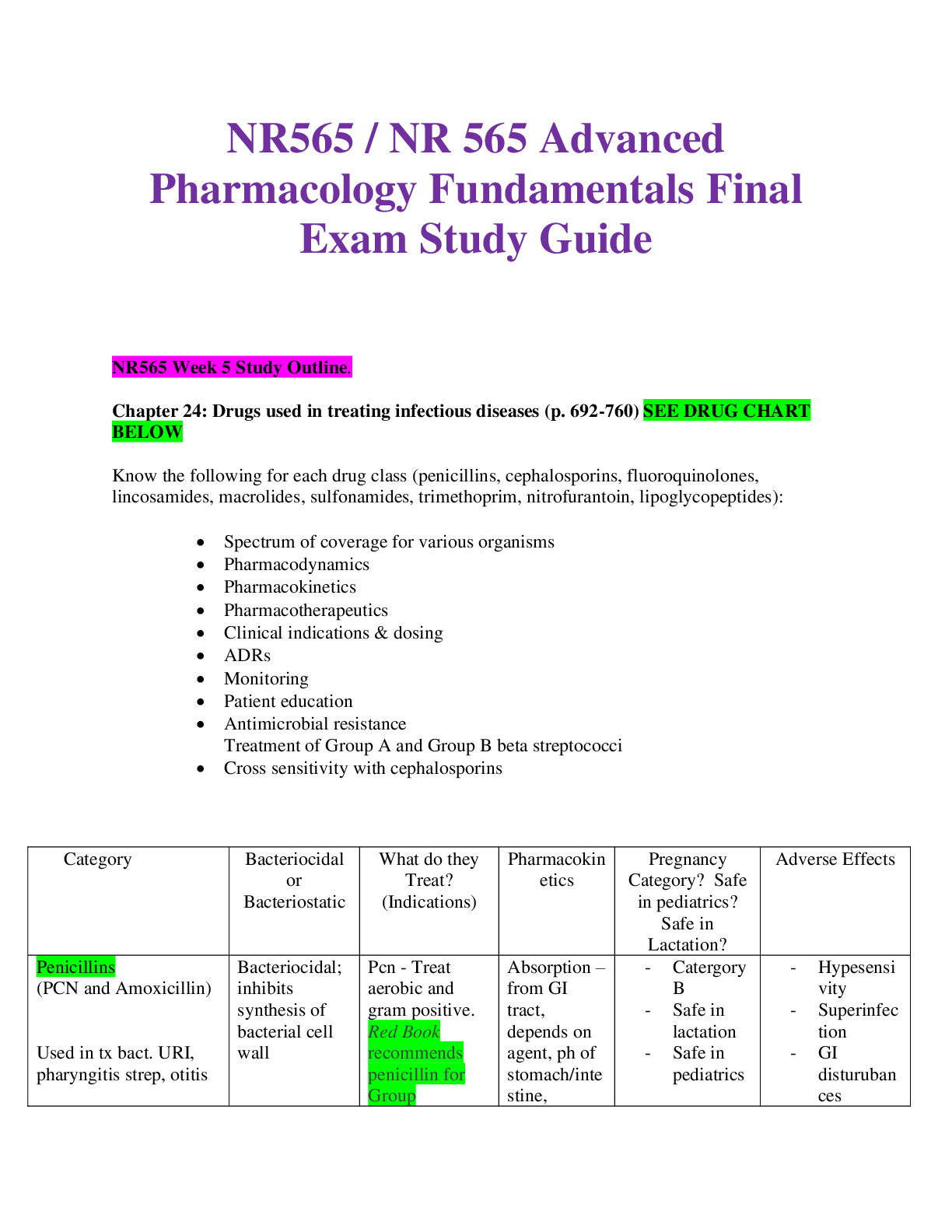
NR565 / NR 565 Advanced Pharmacology Fundamentals Final Exam Study Guide | Rated A
NR565 / NR 565 Advanced Pharmacology Fundamentals Final Exam Study Guide | Rated A | Latest 2020 / 2021 NR565 Week 5 Study Outline. Chapter 24: Drugs used in treating infectious diseases (p. 692-760)...
By nurse_steph , Uploaded: Dec 10, 2020
$13
*NURSING> EXAM > NUR 2063 / NUR2063 Essentials of Pathophysiology Final Exam Study Guide| Modules 1-10 | Highly Rated | Latest, 2020 / 2021 | Rasmussen College (All)
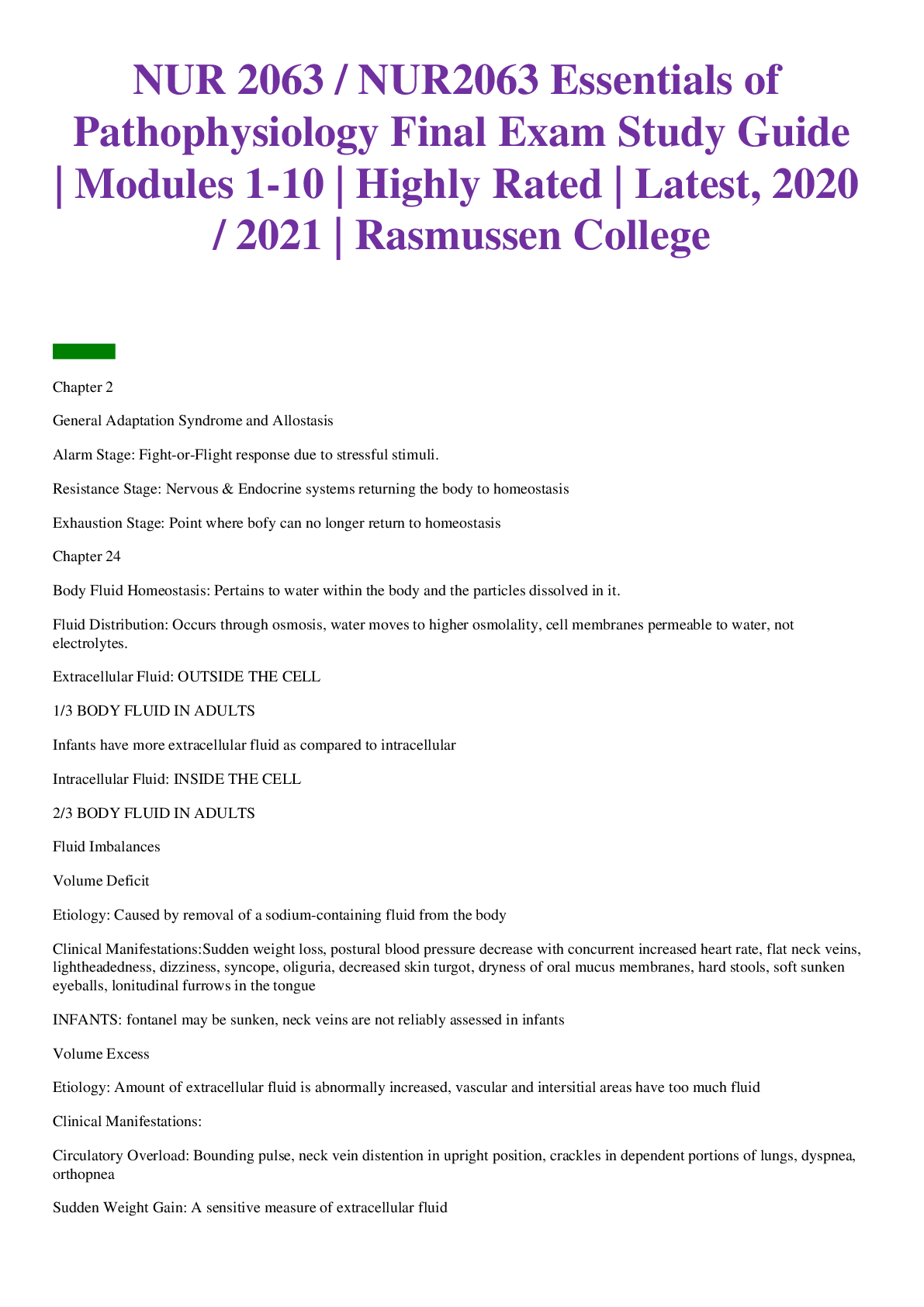
NUR 2063 / NUR2063 Essentials of Pathophysiology Final Exam Study Guide| Modules 1-10 | Highly Rated | Latest, 2020 / 2021 | Rasmussen College
NUR 2063 / NUR2063 Essentials of Pathophysiology Final Exam Study Guide| Modules 1-10 | Highly Rated | Latest, 2020 / 2021 | Rasmussen College Module 1 Chapter 2 I. General Adaptation Syndrome...
By nurse_steph , Uploaded: Dec 11, 2020
$13
*NURSING> EXAM > NR 509 / NR509 Advanced Physical Assessment Final Exam Study Guide | Highly Rated Complete Guide| Latest | Chamberlain College (All)
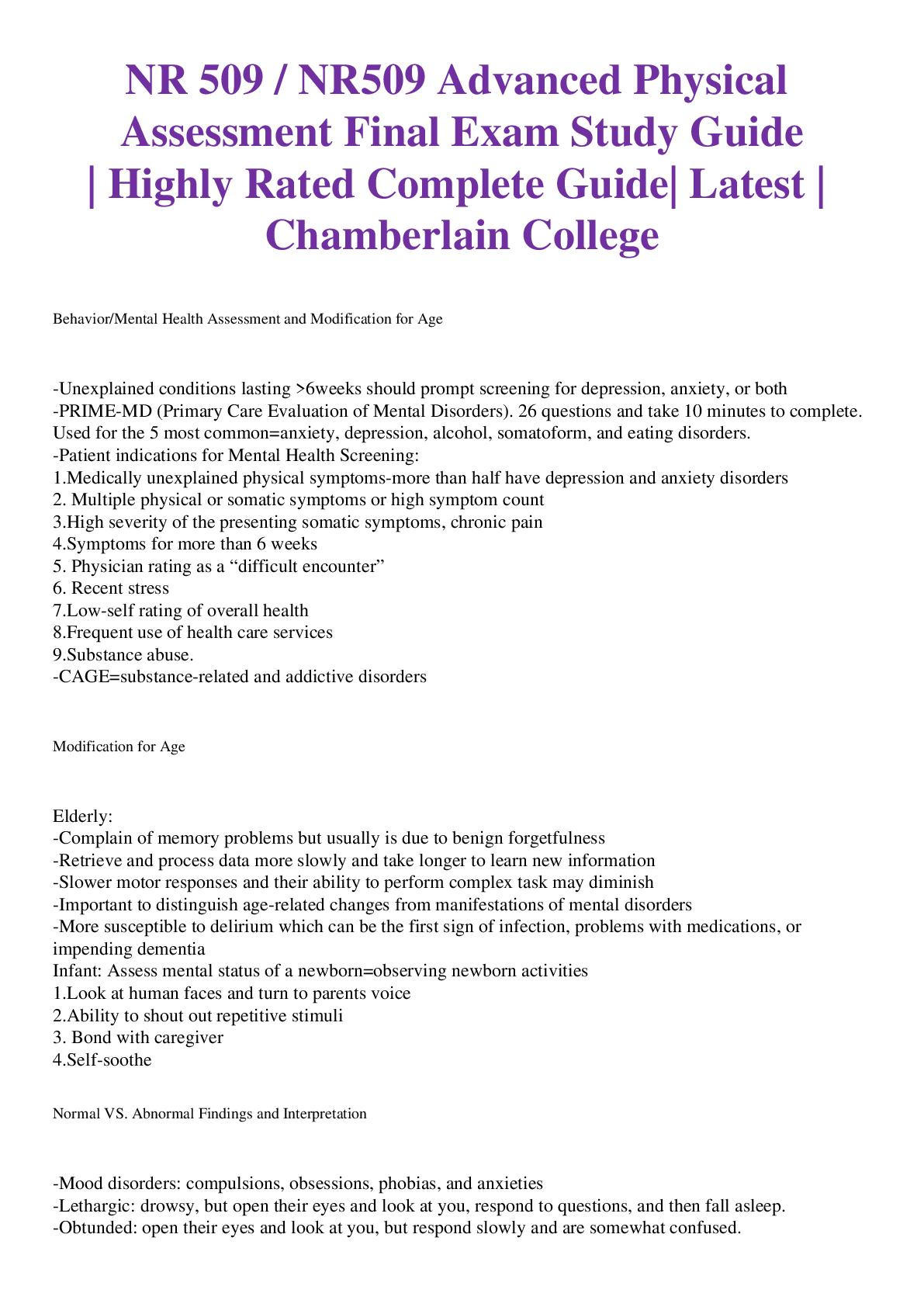
NR 509 / NR509 Advanced Physical Assessment Final Exam Study Guide | Highly Rated Complete Guide| Latest | Chamberlain College
NR 509 / NR509 Advanced Physical Assessment Final Exam Study Guide | Highly Rated Complete Guide| Latest | Chamberlain College Behavior/Mental Health Assessment and Modification for Age -Unexp...
By nurse_steph , Uploaded: Dec 17, 2020
$15
*NURSING> EXAM > NR 599 / NR599 Nursing Informatics for Advanced Practice Final Exam Study Guide | Week 5 -8 | Latest 2020 / 2021 | Chamberlain College (All)

NR 599 / NR599 Nursing Informatics for Advanced Practice Final Exam Study Guide | Week 5 -8 | Latest 2020 / 2021 | Chamberlain College
NR 599 / NR599 Nursing Informatics for Advanced Practice Final Exam Study Guide | Week 5 -8 | Latest 2020 / 2021 | Chamberlain College Ethical decision making ○ When making choices about ethic...
By nurse_steph , Uploaded: Dec 19, 2020
$13
*NURSING> EXAM > NUR2474 / NUR 2474 Pharmacology for Professional Nursing Final Exam Study Guide | Rated A | Latest 2020 / 2021 | Rasmussen College (All)

NUR2474 / NUR 2474 Pharmacology for Professional Nursing Final Exam Study Guide | Rated A | Latest 2020 / 2021 | Rasmussen College
NUR2474 / NUR 2474 Pharmacology for Professional Nursing Final Exam Study Guide | Rated A | Latest 2020 / 2021 | Rasmussen College 1. Insulin: DM 1, DM 2, Gestational Diabetes – HYPOGLYCEMIA IS A...
By nurse_steph , Uploaded: Dec 22, 2020
$11
*NURSING> EXAM > PN VATI Comprehensive Predictor 2020 Exam Study Guide Questions and answers (All)
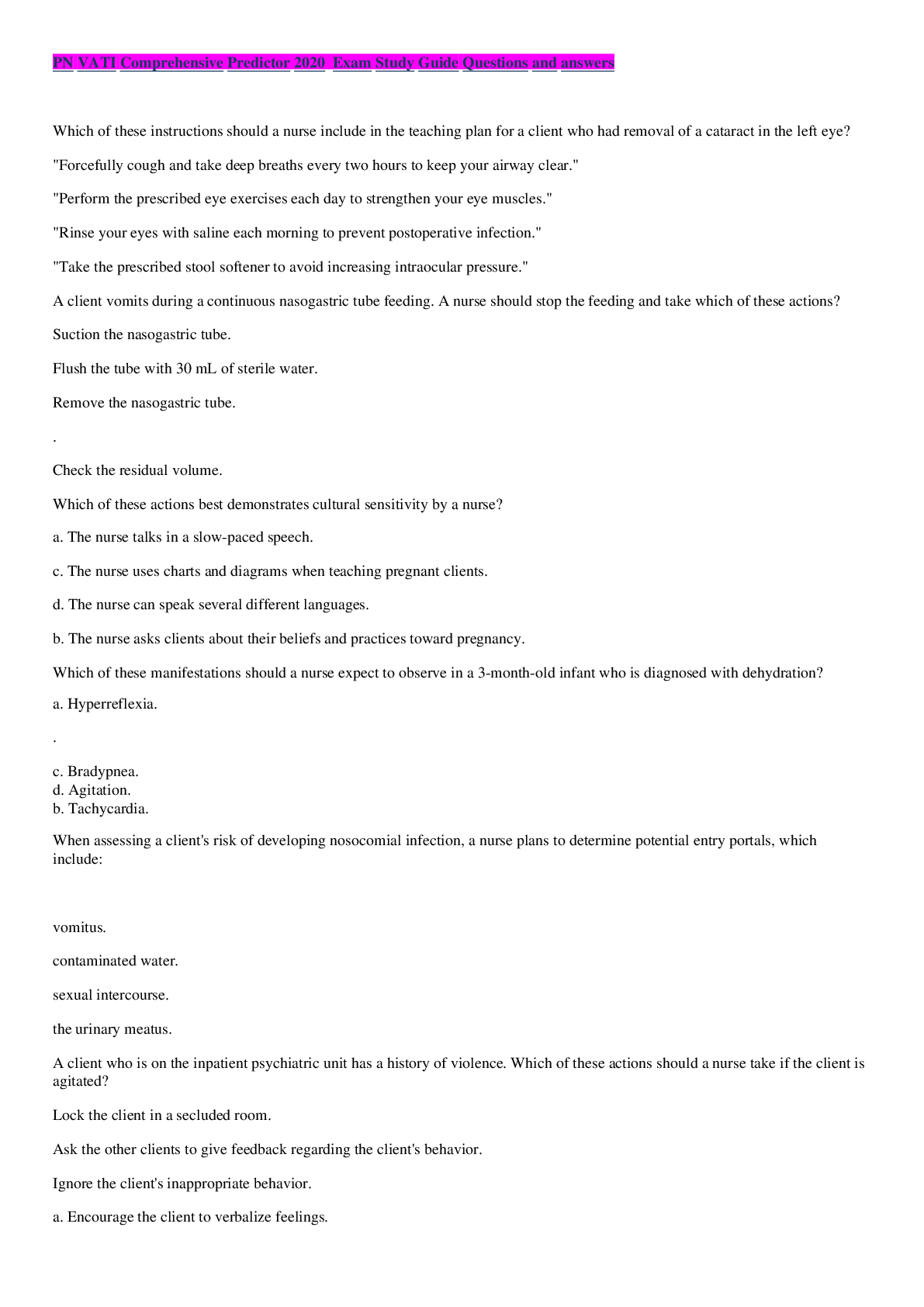
PN VATI Comprehensive Predictor 2020 Exam Study Guide Questions and answers
PN VATI Comprehensive Predictor 2020 Exam Study Guide Questions and answers Which of these instructions should a nurse include in the teaching plan for a client who had removal of a cataract in th...
By tutorcwakuthii , Uploaded: Nov 25, 2023
$11
*NURSING> EXAM > CALT Exam Study Guide 400+ Question and 100% Verified Answers. (All)
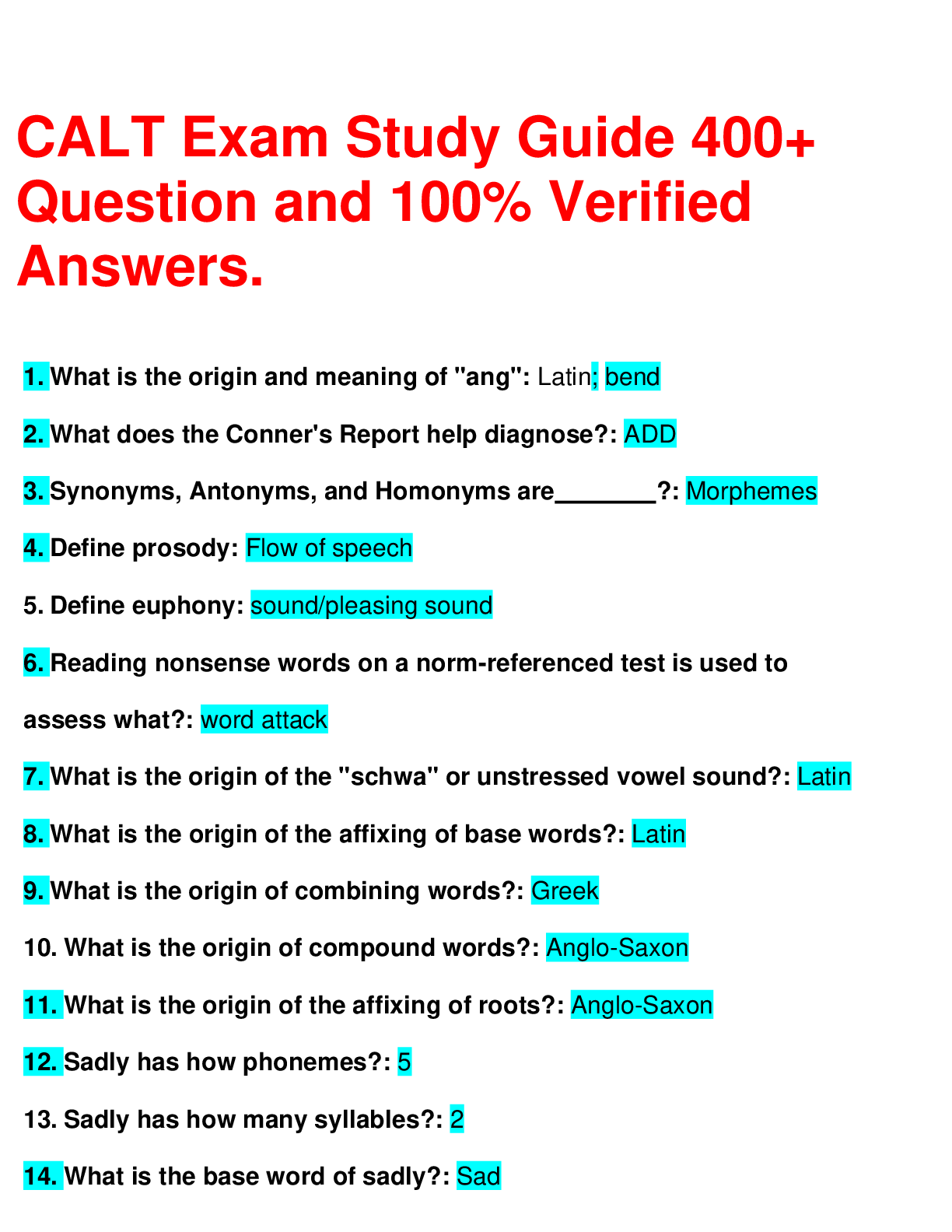
CALT Exam Study Guide 400+ Question and 100% Verified Answers.
CALT Exam Study Guide 400+ Question and 100% Verified AnswersCALT Exam Study Guide 400+ Question and 100% Verified Answers..
By proffecer , Uploaded: Oct 12, 2023
$8.5
Document information
Connected school, study & course
About the document
Uploaded On
Nov 29, 2022
Number of pages
31
Written in
Additional information
This document has been written for:
Uploaded
Nov 29, 2022
Downloads
0
Views
85






